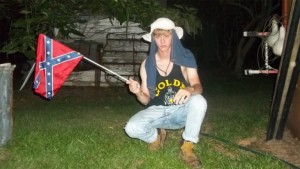By: Charles Ayers
On the evening of June 17, a 21-year-old high school dropout named Dylann Storm Roof walked into the historic Emanuel African Methodist Episcopal Church in Charleston, SC. He spent an hour listening to a bible study group, sitting next to the Church’s pastor, state legislator Clementa C. Pinckney. He then stood up, pulled out a gun, and proceeded to slaughter Mr. Pinckney and eight other people, before fleeing. Roof was arrested 14 hours later in Shelby, NC when police acted on the tip of a motorist who recognized Roof’s car.
A website was soon discovered featuring photos of Dylann Roof and a rambling manifesto. In the pictures, Roof is commonly seen sporting firearms and racist paraphernalia such as the Confederate Flag. It appears that he was not part of an established hate group, and was essential “self-radicalized”. The manifesto makes specific reference to the 2012 shooting of Trayvon Martin as the moment Roof first became interested and eventually immersed in white supremacist beliefs over the Internet.
The mass shooting provoked an outpouring of remorse, and highlighted some of the most divisive social issues of our time, such as gun control, unresolved racial enmity, and political impotence. President Obama’s immediate remarks on the tragedy revealed a deep weariness over responding to yet another episode of mass carnage. South Carolina governor Nikki Hilay stated tearfully that “We woke up today, and the heart and soul of South Carolina was broken”. The general sense of grief was punctuated with anger over social media when it was discovered that the Confederate flag at the South Carolina capital was flying at full mast after the massacre; soon a concentrated effort to remove the flag sprung up in South Carolina, sparking a general national backlash against the divisive symbol.
After a contentious and occasionally emotional debate, the South Carolina Senate and House of Representatives passed a bill calling for the removal of the flag, which the governor then signed. Finally, 23 days after the shooting, the flag was lowered among cheering spectators and heavy security.
Unfortunately, this symbolic move appears to be the only tangible political reaction to the shooting. Discussion over race relations has been bitter and partisan driven, and few substantive proposals aimed at targeting the issues of discrimination and inequality plaguing the African American community have been put forward. Previous supporters for gun control legislation have remained muted, and there appears to be a general sense that despite the continuing, regular horror of mass shootings, no political consensus exists on how to solve the problem.

